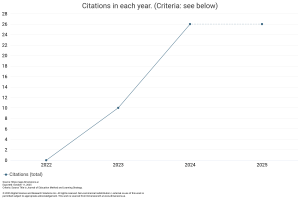Impact of Free Fire Online Games on the Social Behaviorof Class 4 Students of SDN 1 Cipanas Bandung Barat
DOI:
https://doi.org/10.59653/jemls.v2i03.1116Keywords:
Social Studies Learning, Gadget, Game Online, Free FireAbstract
This research aims to explore the impact of playing the online game Free Fire on the social behavior of grade 4 students at SDN 1 Cipanas, West Bandung. By using descriptive research methods with a qualitative approach, this research revealed that several students experienced an addiction to playing online games which had an impact on various aspects of their behavior. Some of the changes observed include increased emotionality, inability to obey rules, and lack of manners due to the habit of speaking harshly while playing games. This research also found that students more often play games outside the school environment, with the main motivation coming from the excitement and feeling of wanting to win that they get from the game. Although there are several positive impacts such as increasing focus, foreign language skills, and expanding friendship networks, the more dominant negative impacts are seen on students' social behavior, such as irritability, lack of healthy social interactions, and difficulty in managing study time. This research suggests several efforts to overcome this addiction, including limiting playing time, finding new hobbies, and placing gaming devices outside the bedroom.
Downloads
References
Ahmadi. (2019). Social Behavior. Jakarta: Rhineka Cipta.
Ajhuri, M.K. (2019). Developmental Psychology Approaches Across the Life Span. Yogyakarta: Pustaka Media Spreader.
Cresswell, J. (2018). Educational Research, Planning, Implementation and Evaluation of Qualitative & Quantitative Research. Yogyakarta: Student Library.
Daryanto. (2012). Management Computer Technology. Jakarta: Gramedia Pustaka Utama.
Feist. (2016). Overcoming Online Game Addiction in Children. Jakarta: Mina Library.
Luthans, F. (2020). Globalization. Jakarta: Bumi Literacy.
Margaretha, PM (2020). Social Behavior. Jakarta: Gramedia Pustaka Utama.
Moch Hamzah Qomarudin, SS (2022). Analysis of the Impact of the Free Fire Online Game on Class IV Students' Interest in Public Elementary Schools. Journal of Learning, Guidance and Educational Management Vol. 2 No. 6 (2022) ISSN: 2797-3174 .
Nurfirdaus, N. (2021). School Environment in Shaping Students' Social Behavior. Vol. 5 No. 2b (2021): Vol. 5 No. 2b (2021): 2nd Edition of National Seminar on Basic Education (Senada) New Civilization in the World of Education .
Putra, FE (2020). How to Become a Free Fire Pro Player. Bandung: Yatagan Publisher.
Rahmad. (2021). The Impact of Smartphone Use on Students' Social Behavior. Vol. 6 No. 2 (2022): EduStream: Journal of Elementary Education .
Santi, T.d. (2021). Changes in Behavior of Elementary School Children Due to Online Games. Journal of Educational Research and Development Vol 5 No 3 P-ISSN: 1979-7109E-ISSN: 2615-4498, 385-390.
Trivena, I. (2019). Today's Gadgets and Social Media. Jakarta: Gramedia Pustaka Utama.
Tumija, A. (2018). Globalization. Jakarta: Bumi Literacy.
Yamin, DF (2021). The Relationship between the Online Game "Free Fire" and Communication Behavior in Class VI Students. Educatio Journal Volume 7, No. 3, 2021, pp. 818-824 E-ISSN 2548-6756 Muhammadiyah University .
Downloads
Published
How to Cite
Issue
Section
License
Copyright (c) 2024 Wirati, Lysda Reviyanti, Muhammad Ramdan Gumilar

This work is licensed under a Creative Commons Attribution-ShareAlike 4.0 International License.
Authors who publish with this journal agree to the following terms:
- Authors retain copyright and grant the journal right of first publication with the work simultaneously licensed under a Creative Commons Attribution-ShareAlike that allows others to share the work with an acknowledgement of the work's authorship and initial publication in this journal.
- Authors are able to enter into separate, additional contractual arrangements for the non-exclusive distribution of the journal's published version of the work (e.g., post it to an institutional repository or publish it in a book), with an acknowledgement of its initial publication in this journal.
- Authors are permitted and encouraged to post their work online (e.g., in institutional repositories or on their website) prior to and during the submission process, as it can lead to productive exchanges, as well as earlier and greater citation of published work (See The Effect of Open Access).
























